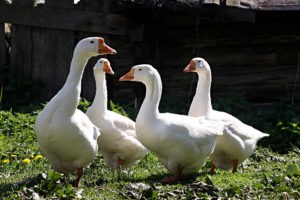Considering a pet that’s a bit out of the ordinary? While cats and dogs often take the spotlight, geese are increasingly waddling their way into the hearts and homes of pet enthusiasts. But Do Geese Make Good Pets? The answer is nuanced, requiring careful consideration of their unique needs and your lifestyle. Before you envision a gaggle gracing your garden, let’s delve into what it truly means to welcome geese into your life as companions.
 Domestic geese. flock of white domestic geese on the farm.
Domestic geese. flock of white domestic geese on the farm.
Understanding Geese as Potential Pets
Geese are not your typical cuddly lap animals, but they possess a unique charm and intelligence that can make them rewarding companions for the right owner. Originating from wild ancestors, domestic geese retain many of their natural instincts, including their flock mentality and strong territorial behaviors. This means they thrive in social groups and can form strong bonds, not only with each other but also with their human caretakers. Hand-raised geese, accustomed to daily interaction, often exhibit docile and even affectionate behavior, dispelling myths of constant aggression. However, it’s essential to remember that each goose is an individual, and their temperament can vary based on breed, upbringing, and individual personality.
Choosing the Right Geese Breed for Pet Ownership
If you’re leaning towards geese as pets, breed selection is a crucial first step. Certain breeds are known for their calmer dispositions and suitability for domestic settings. Experts often recommend breeds like the Toulouse, recognized for their gentle nature and impressive size, the American Buff, prized for their docile temperament and foraging abilities, and the Pilgrim goose, a breed known for its auto-sexing characteristics and friendly demeanor. For beginners, female geese may be preferable as they tend to be less prone to aggression amongst themselves compared to males, especially outside of breeding season. Starting with a small flock of two or three will cater to their social needs and create a more natural and enriching environment for them.
Setting Up the Ideal Habitat for Pet Geese
Providing adequate and appropriate housing is paramount for the well-being of pet geese. These birds require significantly more space than smaller pets, both indoors and outdoors. For nighttime housing, aim for at least one square meter per goose to prevent overcrowding and ensure comfort. Outdoor spaces should be even more generous, with a minimum of two square meters per bird, allowing ample room for grazing and movement. A secure outdoor enclosure is vital, featuring robust fencing to protect your geese from predators such as foxes, coyotes, stray dogs, and even rats. The ground should ideally be grassy, providing a natural foraging surface.
Crucially, geese are waterfowl and require access to water for swimming and preening. A small pool or pond is not just a luxury but a necessity for their physical and mental health. If using a smaller pool, daily cleaning is essential to maintain hygiene. Additionally, geese are susceptible to overheating, so providing shade in their outdoor area is crucial, especially during hot summer months. A pen of approximately 20×40 feet would comfortably house three geese, offering a balance of space for roaming, grazing, and swimming.
Diet and Nutrition for Healthy Geese
One of the appealing aspects of keeping geese is their relatively simple dietary needs. Grass forms the cornerstone of their diet, making up as much as 70% of their intake. Therefore, a spacious grassy yard is not just for exercise but also for sustenance. In addition to grazing, geese naturally supplement their diet with insects and other invertebrates found in the grass. To ensure balanced nutrition, especially for growing goslings and laying geese, commercial waterfowl feed should be provided daily. These feeds are formulated to meet the specific nutritional requirements of geese at different life stages. Fresh, clean water should always be available for both drinking and swimming, contributing to their overall health and hydration.
Health and Wellness of Pet Geese
While generally hardy, geese are prone to certain health issues if their environment and care are not optimal. Foot problems are a significant concern, particularly if geese are kept on hard surfaces like concrete or without adequate swimming water. The lack of soft ground and water can lead to pressure sores and infections in their feet, potentially becoming life-threatening due to their heavy bodies. Regular deworming is necessary to prevent intestinal parasites, and a balanced diet is crucial to avoid limb deformities in young geese. Predator attacks remain a constant threat, highlighting the importance of secure housing. Older female geese may also experience reproductive issues like egg binding. Proactive healthcare is essential, and establishing a relationship with a veterinarian experienced in avian care, particularly waterfowl, is a vital step for any prospective goose owner.
The Pros and Cons of Keeping Geese as Pets
Like any pet, geese come with their own set of advantages and disadvantages. On the pro side, geese are intelligent, social creatures that can offer unique companionship. Their territorial nature makes them excellent watchdogs, alerting you to any disturbances or intruders – they are often more effective than some dog breeds in this regard! Beyond companionship and security, geese provide practical benefits. They lay large, edible eggs, and their molted feathers can be used for various crafts. Furthermore, they are natural foragers, helping to control insect populations in your yard.
However, the cons are equally important to consider. Geese require substantial space, both indoors and outdoors, which may not be feasible for all households. They are vocal animals, and their honking can be quite loud, potentially causing issues in residential areas with noise restrictions or close neighbors. While hand-raised geese can be docile, they can also exhibit aggression, especially during breeding season, and should always be supervised around young children. Daily cleaning of their living areas and water sources is essential, demanding a significant time commitment. Finally, geese have a relatively long lifespan, often living well into their teens, making them a long-term commitment.
Are Geese the Right Pet for You?
So, do geese make good pets? The answer depends entirely on your individual circumstances and willingness to meet their specific needs. Geese are not low-maintenance pets and require considerable space, specialized housing, and consistent care. However, for those who can provide the right environment and are seeking a unique and intelligent companion, geese can be incredibly rewarding. They offer a connection to nature, a sense of security, and a constant source of amusement with their quirky personalities and engaging behaviors. If you have the space, the dedication, and a local avian veterinarian, a flock of geese might just be the perfect unconventional pet for you. Remember to always check local ordinances and neighborhood regulations regarding backyard poultry before bringing geese home.
